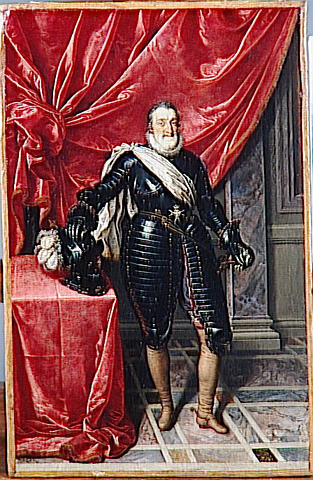padisha emperor
Senior Member
This is a thread to speak about an important time of the french history, but not well known. Also a dark time. The Wars of Religions, from 1562 to 1598 - officialy - , between the Catholics and the Protestants (also called "Huguenots", from the german word eidgenossen, confederate)


text from : http://www.museum.co.za/wars_of_religion.htm

Charles IX, King of France

Henri III, King of France, assassinated in 1589 by a fanatic monk, Jacques Clément, to avenge the Duke de Guise.

Henri IV, King of France

Henri de Guise, Duke de Lorraine, leader of the Catholics, chief of the "Sainte Ligue" (Holy League), assassinated in 1588 at Amboise's castle.

Amiral Gaspard de Coligny, chief of the Huguenots, assassinated in 1572 during the Saint Bartholomew's night.

Catherine de Medicis, Queen of France (widow of Henri II), she had a big influence on her sons, paertuclarly Charles XI and Henri III, mother of François II, Charles IX, Henri III and François, Duke d'Alençon.
Here is really really more about the Religious wars, it is really complete, but quite long too. But if this subject interesting you, click here, here is all what you want to know about the Wars of Religion in France.
more about it
Enjoy


The next king was FRANCIS II (1559-1560)(after his father's death, Henri II, killed accidently during the tournament for the celebration of the wedding between his daughter and the King of Spain - PE's add-on) who was a minor, married to Mary, Queen of Scots. After his sudden death he was succeded by his brother CHARLES IX (1560-1574), also a minor, whose mother, CATHERINE DE MEDICI acted as Regent. She tried to promote peace between the Catholics and Protestants by granting certain privileges to the Huguenots by means of the EDICT OF ST GERMAIN (17th January, 1561).
The peace became short-lived when on 1st March, 1562 a number of Catholics descended on a large Huguenot assembly in Vassy, killing 30 and wounding about 200. The Wars of Religion which followed (1562-1598), were a direct consequence of these VASSY MURDERS. Numerous attempts at bringing about peace followed, but proved unsuccessful.
By August 1570, the Regent Catherine de Medici was forced to declare the PEACE OF ST GERMAIN to prevent the Huguenots from taking Paris. Their leader, Gaspard de Coligny, succeded in obtaining freedom of religious practice in all cities except Paris.
GASPARD DE COLIGNY was an Admiral of France as well as Governor of Picardy. He joined the Protestants in 1559, soon becoming their leader and spokesman.
The Peace of St Germain had illustrated clearly just how much power was vested in the Huguenots. The Catholics feared this power and it was decided to eliminate the Huguenots, particularly their leaders.
With the marriage of Prince HENRY OF NAVARRE, a Huguenot, to Marguerite de Valois (daughter of Catherine de Medici) on 23rd and 24th August, 1572 a golden opportunity presented itself. During this Feast of ST BARTHOLOMEW, thousands of Huguenots, including De Coligny, were massacred in Paris by the soldiers of the King. Henry of Navarre escaped, but in the weeks following, murder and mayhem spread throughout France. Many Huguenots fled to other European countries as a result. Numerous Religious Wars followed under the leadership of Charles IX.
Charles IX was succeded by his brother HENRY III (1574-1589).
As he was childless, he was succeeded by Henry of Navarre as HENRY IV (1589-1610). Having adopted Catholicism for political reasons, Henry IV yet remained well disposed towards the Huguenots. He was able to bring an end to the Religious Wars through the PEACE OF VERVINS. On 13th April, 1598 through the proclamation of the EDICT OF NANTES he provided the Huguenots with more religious and political freedom than ever before. Under his reign France became united and a period of peace followed.
After the death of Mazarin in 1661, LOUIS XIV (1643-1715) the Sun King, began his reign. He went to great lengths to convert the Huguenots. When even the billeting of dragoons in Huguenot households, the infamous DRAGONNADES, had no effect he proclaimed the EDICT OF FONTAINEBLEAU on 17th October, 1685.
This revoked the Edict of Nantes and resulted in the Huguenot persecutions being resumed. Once again the Huguenots fled in large numbers (200 000 and more) to other countries in Europe as well as England and America. The Netherlands received a large number of refugees, some of whom came to the CAPE.
text from : http://www.museum.co.za/wars_of_religion.htm

Charles IX, King of France

Henri III, King of France, assassinated in 1589 by a fanatic monk, Jacques Clément, to avenge the Duke de Guise.

Henri IV, King of France

Henri de Guise, Duke de Lorraine, leader of the Catholics, chief of the "Sainte Ligue" (Holy League), assassinated in 1588 at Amboise's castle.

Amiral Gaspard de Coligny, chief of the Huguenots, assassinated in 1572 during the Saint Bartholomew's night.

Catherine de Medicis, Queen of France (widow of Henri II), she had a big influence on her sons, paertuclarly Charles XI and Henri III, mother of François II, Charles IX, Henri III and François, Duke d'Alençon.
Here is really really more about the Religious wars, it is really complete, but quite long too. But if this subject interesting you, click here, here is all what you want to know about the Wars of Religion in France.
more about it
Enjoy

 Seems they are the ones that could use reminders of their glorious history.
Seems they are the ones that could use reminders of their glorious history.

